 Chapbook by Seth Pennington
Chapbook by Seth Pennington
Review by John Venegas
Let’s get something sorted out before we get started: you are a mind, a soul if you want, spinning in circles on the skin of a planet that is spinning in circles in the grip of a star that is spinning in circles with a horde of its siblings that are moving inconceivably fast through the universe. Does that give you vertigo? Lovecraftian dread? Can you imagine that mind, your mind, being pulled along by an impossibly circuitous current, given the flickering light of consciousness to try and amass some semblance of a personal picture of everything? We all deal with this, one way or another. Some accept it. Some are fascinated, terrified, or confused, or some combination of the three. Some stick their head in the stand and wait for it to end. I didn’t imagine that I would find a beautiful, touching, and measured response to these ideas in a tiny little chapbook. But, thanks to Seth Pennington, I am very much enjoying being proven wrong.
To be clear, the poetry chapbook Tertulia is no heady science fiction romp. It is a text that embeds itself in the deeply, often uncomfortably personal. It spends little time staring up at the stars, dreaming, instead wading into a river of sensation and emotion that it is not entirely sure it will be able to emerge from. Tertulia looks at the microcosms, the reflections of the impossible vastness that can be found within the people that we love, the people that we hate, and the people to which we never give any thought. When you hear writers talk about getting into the flow, it is usually in reference to some flood of genius that compels them to write. Such an idea is romanticized and dramatized to no end, but here, in my opinion, is evidence of the real thing – an experience of flow for the intense, frightening thing it can be.
a new leg and terror at living with death
having been so certain, more certain than
any other day’s death you hadknown. The blue on your lawn, it’s lying
so light the green is showing through,
as if color could be purer
This is fascinating use of spacing and structure, in a way that, intentional or not, encapsulates the experience and potential of writing poetry. For me, the power of the stanza break is critical. The pause, the holding of breath, feels as though the speaker is hesitating, waiting for something. When combined with the subjects under discussion, it is as if the speaker is afraid after having invoked death while simultaneously dealing with an array of color that feels unnatural. The speaker is giving us glimpses, moments in time and space that can only be conveyed through words. The chapbook is full of moments like this, where not an ounce of space is wasted and the fat is trimmed away. The speaker seems to be giving us only what is most important in the moment, be it the smell of sweat or the sight of aging pendulous breasts or the taste of dirt and forgotten lovers. It is precise poetry that knows how to hide its seams.
With the word choice and structure being so specific, it is little wonder that the language works exceedingly well. I found myself feeling genuinely guilty as I read, because there were several moments where the quality of the word play had me grinning like an idiot or marveling at the taste in my mouth, only to realize or remember that the thing being described was tragic or solemn. It’s like seeing a beautiful person at a funeral and forgetting where you are for a long moment.
Your family finds you bent over beyond your
breasts, the silver hair of your lip wet with
effort, with violent prayerfuls of sweat. And finally
when you move to speak, only dirt can
all from your mouth –
your wanting to taste him.
My choices of excerpts aside, there is far more than only lament. A tertulia is a gathering, often of artists, for the purposes of discussion and, while I cannot be certain that the title was chose for this reason, it is at least quite the coincidence that we see a wide array of passions on display. Lovers thirst and reassure. Families reminisce and bicker. Friends are born and multiply. As the current drags you, the reader, further and further out in the water and feeds you glimpses of lives, of moments, you can see the pattern, the echoes of answers to those questions of mortality and time and legacy and impermanence. This little chapbook does what often takes the whole of novels and compendiums, touching that deepest spark in all of us and reminding us to open out eyes and see.
Tertulia is available now through Sibling Rivalry Press.

 Essays by Fleur Jaeggy
Essays by Fleur Jaeggy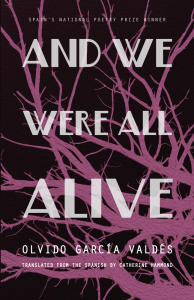 Collection by Olvido García Valdés
Collection by Olvido García Valdés Review by Liz von Klemperer
Review by Liz von Klemperer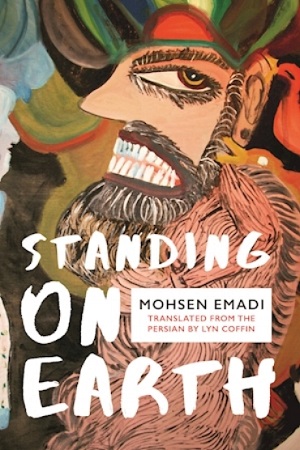 Standing on Earth, by Mohsen Emadi
Standing on Earth, by Mohsen Emadi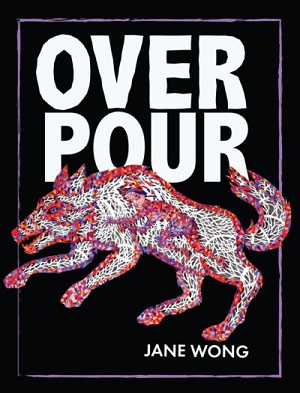 Overpour, by Jane Wong
Overpour, by Jane Wong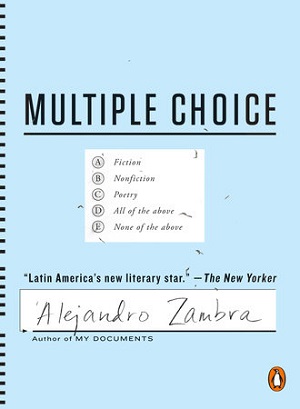 Multiple Choice by Alejandro Zambra
Multiple Choice by Alejandro Zambra Luna Park, by Luis Cardoza y Aragon
Luna Park, by Luis Cardoza y Aragon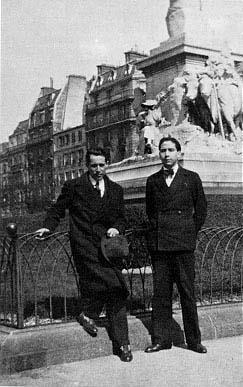 Luna Park (1924, 2016) is Luis Cardoza Y Aragón’s first collection of poetry. It is translated from the Spanish by Anthony Seidman, thrust into the thick of this decade’s hazy Twitter feed by Alan Mills, and steeped in the kinetic energy of Daniel Godínez-Nivón’s graphics.
Luna Park (1924, 2016) is Luis Cardoza Y Aragón’s first collection of poetry. It is translated from the Spanish by Anthony Seidman, thrust into the thick of this decade’s hazy Twitter feed by Alan Mills, and steeped in the kinetic energy of Daniel Godínez-Nivón’s graphics. Forbidden Fruit, by Stanley Gazemba
Forbidden Fruit, by Stanley Gazemba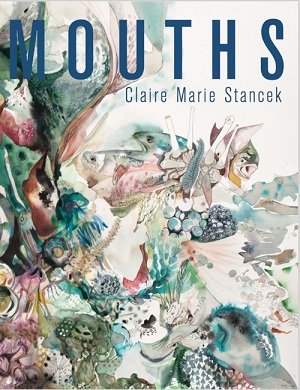 Mouths, by Claire Marie Stancek
Mouths, by Claire Marie Stancek Confetti-Ash, Selected Poems of Salvador Novo
Confetti-Ash, Selected Poems of Salvador Novo Inside V, by Paula Priamos
Inside V, by Paula Priamos